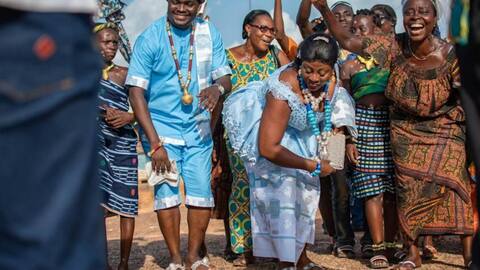Matriarchal marvels: 5 tribes worldwide dominated by women
What's the story
Throughout history, diverse societies have embraced unique social structures, and among them are tribes where women not only participate but indeed hold the reins of leadership, and play a central and dominant role in different spheres of governance and decision-making. Here, we delve into five fascinating tribes across the world where women rule, challenging traditional gender norms.
China
The Mosuo of China
In Mosuo households, women hold key positions in familial and communal affairs, passing down property through the maternal line. While commonly labeled as one of the last matriarchal societies, a more precise description of Mosuo traditions would be matrilineal. In the broader societal context, men retain political influence, but within their households, women assume leadership roles and are responsible for decisions regarding family resources.
India
The Khasi of India
In 2011, this matrilineal community numbered around one million. Childcare duties are exclusively entrusted to mothers and mothers-in-law, with men excluded from family gatherings. Notably, in the Khasi tribe, upon marriage, it is the wife's surname that perpetuates, diverging from the customary practice of adopting the husband's surname. Women, known as "Ka Khadduh" or "Mother of the Household," wield significant influence in familial matters.
Indonesia
The Minangkabau of Indonesia
With a population of four million, the Minangkabau people of West Sumatra, Indonesia, constitute the largest matrilineal society known today. Enforcing tribal laws that dictate the inheritance and management of clan property from mother to daughter, the Minangkabau uphold a profound belief in the paramount role of mothers as the most significant individuals in their society.
Costa Rica
The Bribri of Costa Rica
Residing in the Talamanca canton of Costa Rica's Limón province, the Bribri, a modest indigenous community numbering just over 13,000 individuals, live within a matrilineal framework. Organized into clans defined by extended family ties, the lineage is determined through the maternal line. In this society, women exclusively hold the traditional right to inherit land and play a central role in bribri rituals.
Colombia
The Wayuu of Colombia
The Wayuu tribe, traditionally led by male chieftains, underwent a transformative shift almost two decades ago. The community embraced a new governance tradition, exclusively appointing women as leaders. Recognizing the innate qualities of women, characterized by a focus on humanity and peace, the tribe changed established norms, leveraging women's dialogue skills to resolve conflicts and instigate a cultural transformation.
